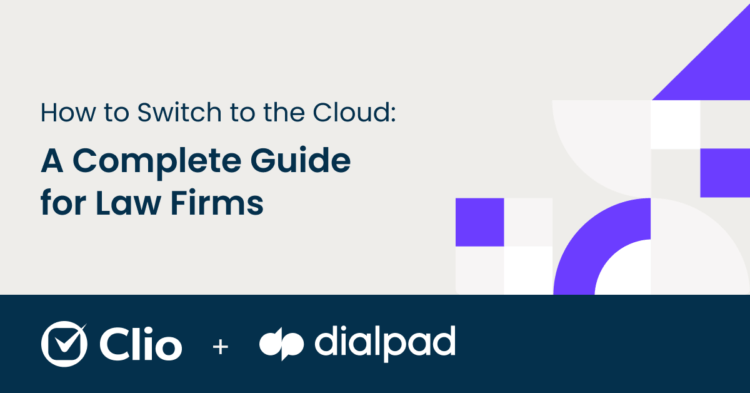If you’re wondering what a cloud-based law firm is, cloud technology is a network of hosted resources accessible via the internet. And a cloud law firm is a firm that uses cloud technology to run its business.
Cloud software makes it easy for law firms to use various applications to help run their practice. And seeing how law firms who use multiple technologies generate, on average, 40% more than those who don’t, cloud law firms have a clear business advantage.
While the term cloud technology may seem foreign or futuristic, chances are, you frequent the cloud without realizing it. If you’ve ever used Amazon, posted on Facebook, or logged into Gmail, you’re already a cloud technology user. And as a cloud user, you can attest to its benefits. Cloud technology offers flexibility and freedom paramount to providing an exceptional client-centered experience. There’s never been a better time to consider switching to the cloud.
What is a cloud-based law firm?
A cloud-based law firm is one that uses cloud technology to run key elements of its business. Legal professionals can use cloud technology to streamline bookkeeping, client intake, payments, and more.
How does cloud technology work?

Cloud technology is surprisingly straightforward: Users access the software through a web browser or dedicated app. Because the company that develops and owns the cloud software hosts the servers, users don’t have to install any software on local systems. It’s up to the company to prioritize the protection of their users’ data as well as the users having access to everything they need. And because this is the backbone of their business, technology companies make this their primary focus.
Why do law firms use cloud technology?
Cloud technology has propelled many industries forward, including healthcare and government. In fact, nearly half of the US state and federal governments rely on the cloud.
What’s responsible for the fairly recent cloud adoption in the legal industry? Some reasons include rapid cybersecurity advancements, growing client demand for more advanced technology, and the ability for law firms to improve efficiency while cutting costs. Though, more recently, we watched the pandemic force all businesses to adapt like never before. Entrepreneurs and business owners—including attorneys—had to adapt rapidly to the evolving business environment. With cloud technology, firms are more flexible and can better meet these ever-changing customer demands and market shifts.
You may like these posts
Is the cloud secure?
One common misconception is that cloud storage—or a cloud law firm—is unsafe. However, this is a misconception because there were more cybersecurity limitations when the cloud was first introduced, compared to today.
In recent years, there’s been significant investment and growth in cybersecurity systems, paving the way for innovative technologies to be safer and more reliable. It’s also important to understand that technology companies invest enormously in security, backup servers, teams of IT professionals, and additional security infrastructure.
As cloud technology grows and enhances how lawyers run their firms, an interesting correlation occurs. Cloud technology continues to gain traction, and the setbacks from on-premise servers have become more pronounced. The truth is it’s never been safer or more advantageous to become a cloud law firm.
The limitations of servers
Businesses can’t afford to be docked and stalled by on-premise systems in this fast-paced world, especially not the legal industry. Clients need to reach your firm when they need you, wherever you may be. On-premise servers keep you and your team tied to your office. This has always limited businesses, but now it’s exponentially dangerous for the health of your business. After all, the 2021 Legal Trends Report found that 79% of clients want the option to work remotely with their lawyers. If clients no longer value the in-person office experience as much, that’s all the more reason to cut costs on large office spaces and run your firm virtually. This isn’t possible with on-premise servers.
Not to mention, cloud technologies can streamline accounting, client-intake, payment processes and more. You can quickly add safe, cost-effective applications which integrate seamlessly with your legal practice management software. When used in tandem with legal practice management software, these integrations can automatically run and measure every area of your law, giving you the necessary data to optimize your business. Being a cloud law firm is better for you, your clients, and your bottom line. And just imagine the ease of onboarding new staff when you can swiftly optimize workflows and processes with the right cloud-based tools.
Going from servers to the cloud

Moving your practice from relying on on-premise software to the cloud isn’t as difficult as you think. Plus, the value you get from this transition makes the change worth it. You can read more about cloud hosting costs here if you’re looking to budget for a switch.
Developed in partnership with Dialpad, our latest guide, Switching to the Cloud: A Guide for Law Firms, explains how cloud-based legal technology provides the benefits of multiple tools in one place—and enables you to run your firm seamlessly.
We published this blog post in March 2022. Last updated: .
Categorized in: Technology
Free On-Demand Webinar - Watch How Law Firms Use Clio
Watch this walk-through to see why over 150,000 legal professionals use Clio’s leading cloud-based legal software.
Watch now





